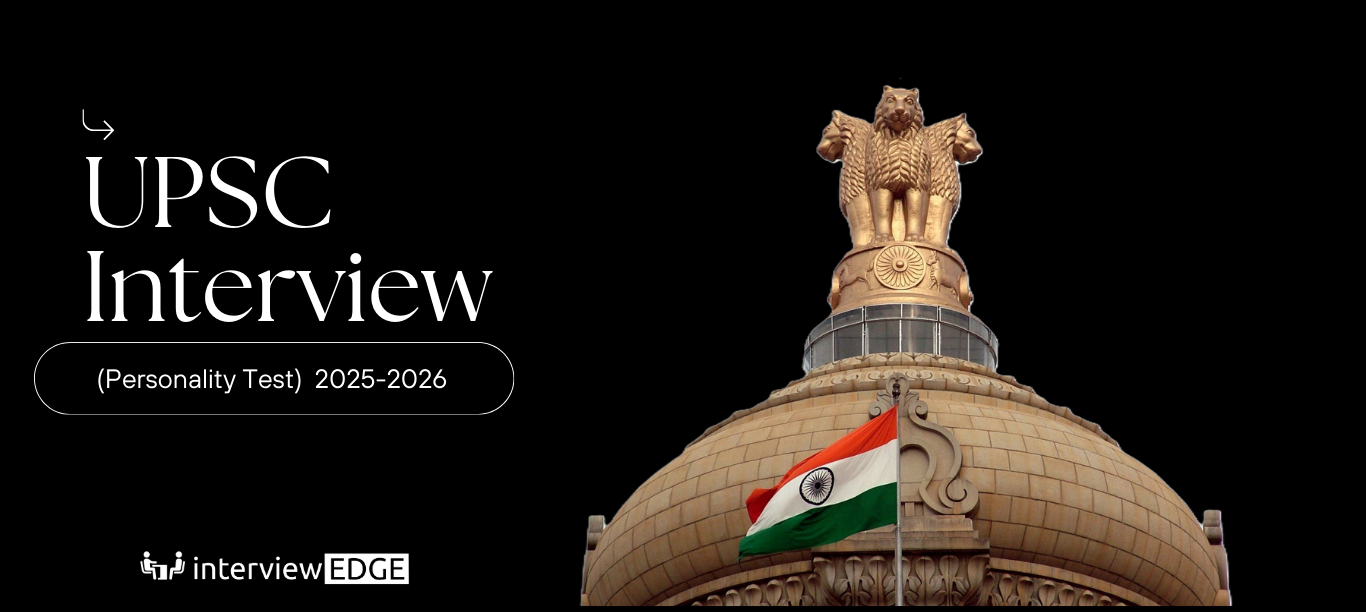
With the UPSC Mains behind you, the wait for results has begun. While the outcome isn’t out yet, now is the perfect time to start preparing for the next stage — the Interview (Personality Test). Starting early gives you a real edge before the results are out and time flies.
This stage carries 275 marks, which may seem “small” compared to Mains, but don’t underestimate its weight. Often, when written scores are closely bunched, your interview performance decides whether you secure your dream service or fall behind. More than knowledge, this round is about you — your personality, presence of mind, and ability to think clearly under pressure.
Why the Interview Really Matters
-
The rank decider: If two candidates have near-identical Mains marks, the Interview can tilt the scale.
-
It’s about the person, not just the syllabus: Mains tests knowledge; the Interview tests who you are — your clarity of thought, honesty, maturity, and how you handle tricky or unexpected situations.
-
Beyond facts: It’s less about recalling statistics, more about reasoning, balance, and communication.
What to Expect Inside the Interview Room
1. The Panel Setup
Typically, the panel has 5 members, with a UPSC member heading it. The setting is formal but often feels like a guided conversation. The tone may shift occasionally to test your composure — stay calm and thoughtful.
2. Areas of Questions
-
Your DAF (Detailed Application Form): Every detail — hometown, school, degree, work experience, hobbies — is fair game. Be ready to discuss each line confidently.
-
Current Affairs: Focus not only on “what happened” but also on why it matters. Policies, economic debates, and social issues are discussed for your perspective, not just headlines.
-
Situational & Ethical Scenarios: Questions like “What would you do as a DM?” or “How would you handle a conflict of interest?” test judgment and balance.
-
Profile-based/Technical: Your background may prompt deeper questions in areas like law, medicine, engineering, or prior work experience.
-
Hobbies & Interests: If you’ve mentioned them, be ready to explain why you enjoy them and what you’ve learned.
3. What They’re Really Looking For
-
Clear and logical thinking
-
Confidence without arrogance
-
Integrity and honesty
-
Leadership and responsibility
-
Calmness under stress
-
Self-awareness
-
Practical, grounded answers
How to Prepare Effectively
1. Reflect on Yourself
Think about your life journey — school, challenges, turning points, achievements, even failures. Be ready with 3–5 strong personal stories that show qualities like perseverance, empathy, or problem-solving.
Remember: the stories you share are not just examples — they’re glimpses of who you are. Own them confidently.
2. Know Your DAF Inside Out
Read your DAF multiple times. Every detail is a possible question. Ask yourself: Why did I write this? What does it say about me?
3. Stay Updated with Current Affairs
Go beyond headlines. Focus on why an issue is important, its pros and cons, and the broader picture. For deeper prep, see:
👉 Broadening Your Perspectives Through Reading
4. Work on Communication
The panel evaluates not just what you say, but how you say it. Clarity, tone, and body language matter. Learn more here:
👉 Sharpening Your Communication Skills
5. Mock Interviews & Feedback
Simulated interviews help you test yourself and improve. Learn more:
👉 Practicing and Seeking Feedback
6. Manage Stress and Mindset
It’s natural to feel nervous. But nerves can be managed. Strategies here:
👉 From Nervous to Confident: Psychological Strategies for UPSC Interview Room
7. Balanced Opinions
Avoid extremes in your answers. Balanced, nuanced responses stand out. Read more:
👉 The Art of Balanced Opinions
Explore Previous Guides for Detailed Prep
We’ve covered each dimension of interview preparation in detail over the past year. If you haven’t gone through them yet, here are some must-reads:
And yes — this year too, we’ll soon share an updated post on “Knowing Your Panel” with the latest information on UPSC chairperson and board members. Stay tuned!
Key Mindset Tips
-
Treat the interview as a conversation, not an interrogation.
-
Be sincere — it’s okay to say “I don’t know” or “From what I understand…” rather than bluffing.
-
Show qualities of a civil servant: empathy, calmness, resilience.
-
Trust your journey. Reaching this stage means you already have what it takes — the interview is about showing it naturally.
All the best for your Personality Test! Remember: the panel isn’t searching for “perfect” candidates, but genuine, thoughtful individuals ready to serve.
A Note from Us: Introducing UpliftEDGE
At InterviewEDGE, we’ve always focused on guiding you for the UPSC Interview. But over the years, we’ve realized something important — behind all the preparation lies an emotional journey that often goes unnoticed.
That’s why we’ve launched UpliftEDGE — a gentle companion for your mental and emotional well-being. It’s not about interview questions or current affairs; it’s about you.
Whether you’re stressed, anxious, or just need a safe space to share, UpliftEDGE is here with support, understanding, and zero judgment. Because true success isn’t only about cracking the interview — it’s also about feeling balanced and cared for along the way.
